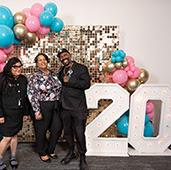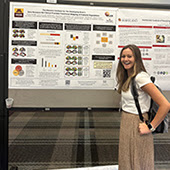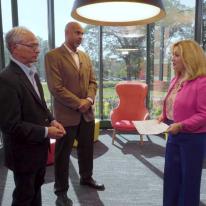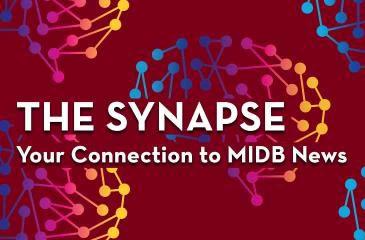The Synapse: Nov. 2023
Largest Long-Term Study of Early Brain and Child Development Launches at U of M

U of M researchers recently launched enrollment for the largest long-term study of early brain and child development in the United States. The HEALthy Brain and Child Development (HBCD) study is now enrolling individuals from around the United States, including in Minnesota, who are in the second trimester of pregnancy.
The U of M was selected as one of 28 recruitment sites across the country for the project, and also serves a key role in the central HBCD Data Coordinating Center. The study will enroll about 7,500 pregnant people nationwide and follow them and their children for up to 10 years through infancy and childhood.
According to MIDB’s Sylia Wilson, PhD, an associate professor in the Institute of Child Development, this is a pivotal moment for our society to begin gaining a deeper understanding of child development, including the potential long-term impacts of substance exposure during pregnancy, and a host of other environmental factors, on the developing brain. This research will give us a more complete picture of healthy brain development for all children. Read more about the study.

Working to Uncover the 'Wiring Diagram' of the Brain
MIDB Co-Director Damien Fair, PhD, is part of a team of scientists involved working on a groundbreaking project of unraveling the mysteries of the brain's ‘wiring diagram.’ Using cutting-edge techniques, this research aims to discover how the brain's neurons are connected and communicate with each other. The project is supported by a $16 million grant from the National Institutes of Health Brain Research Through Advancing Innovative Neurotechnologies® (BRAIN) Initiative. Read more about this project.

Squeezed: Caregivers Report Less Help, More Stress
A new survey from the U of M and The Arc of the United States shows more than half of family caregivers are suffering from very high or extreme levels of stress, despite a nationwide work-from-home trend. More than 40 percent have left their jobs to care for their loved ones with intellectual and developmental disabilities (IDD), and 90 percent say their careers have been negatively affected by their caregiving responsibilities, including many who are underemployed. The survey and report, 2023 Family and Individual Needs for Disability Supports (FINDS), includes input from 3,118 participants caring for family members or friends with IDD across all 50 states and U.S. territories. Read more about the survey and report.

Anita Randolph, PhD, Receives NIH Funding to Support Neuroscience Education and Engagement for Underrepresented Middle-to-High School Students
Director of the Community Engagement and Education (CEEd) Hub Anita Randolph, PhD, has received a $1.35 million grant from the National Institutes of Health Research Education Program to bolster its neuroscience education programming. She will work with a consortium of collaborators, which include faculty from the Neuroscience Opportunities for Discovery and Equity (UMN NODE), Extension and the Departments of Neuroscience, Institute of Child Development, Psychiatry, and Pediatrics, among others, to develop an intervention to facilitate meaningful educational experiences for racially minoritized and other underserved 6th-8th grade students. The overall aim of this multi-faceted intervention is to help these students explore potential opportunities in neuroscience. Read more about this programming.

Kudos
Congratulations to the trainees who were awarded a Summer 2023 MIDB Seed Grant:
- Blake Gimbel, PhD
- Timothy Monko, PhD
- Kelsey Johnson, PhD
- Maddie Fung, BS
- Emmanuel Bonney, MPhil, PhD
The publication by Angie Mejia, PhD, “Beyond ‘Thick Description’: Racially-Minoritized Women and the Teaching and Learning of Qualitative Research Methods,” in Practicing Anthropology was a source of intellectual inspiration for the theme of the journal's edition, "Weft and Warp: Weaving Creativity and Career." The text from the journal's front page states, "This title is inspired by Angie Mejia’s article on mentoring. We call attention to Mejia’s creative, thoughtful contribution and honor descriptions of weaving a rebozo or shawl of experience ‘as a Student of Color in an anthropology program and her current work as an assistant professor mentoring undergraduates wishing to learn qualitative methods.’”
Anita Randolph, PhD, is an author of the chapter, "Working with the Community to (Re)establish Trust and Engage Authentically and Sustainably," in the book “Anti-Racist Community Engagement Principles and Practices,” which received the International Association for Research on Service-Learning and Community Engagement (IARSLCE) Diversity Equity and Inclusion Award.
Jeffrey Wozniak, PhD, LP, was named Mentor of the Year by the Clinical and Translational Science Institute. He is a mentor for the K12 Scholars Career Development Program.

Supporting Our Communities
Last month, MIDB was a presenting sponsor of Autism Society of Minnesota's Cocktails for a Cause, a fundraiser that supports local families and individuals affected by autism.
MIDB also sponsored LifeHaven’s 20th anniversary celebration on Oct. 5. LifeHaven Transitional Living has supported 16- and 17-year-old mothers and their children experiencing homelessness since 2003. Read more about the event.

New Resource Closet at MIDB
Located on the first floor near the information desk, MIDB's new resource closet provides immediate support to visitors in need of diapers, wipes, hygiene supplies, and some clothing. Thanks to the support of a donor and MIDB for funding the start of this endeavor.

Help Spread the Word: Paid Summer Research Program for Undergraduate Students
The U of M Division of Biostatistics and MIDB invite eligible undergraduate students to apply for the Equitable Data Science in Adolescent Development Summer Research Program for Undergraduates. This 10-week program is a paid, full-time position designed to give undergraduate students hands-on training and research experience in data science, statistical modeling and machine learning, and scientific communication. Learn more about the program.

Expanding Understanding of Developmental Cognitive Neuroscience at the 11th Annual Flux Congress
Many MIDB members and students attended last month's Flux Congress in Santa Rosa, Calif. The annual event is held by the Flux Society, which aims to advance the understanding of human brain development by serving as a forum for professional and student scientists, physicians, and educators. Kristina Hufnagle was excited to return to this year's event to reconnect with people she met at last year's conference and learn about recent advances in the field and where gaps still remain. "I really enjoyed the roundtable discussion on the intersection of cognitive neuroscience research and the translational policy applications of our work," she said. "It's easy for folks to lean into the granular level of research, and understanding the broader implications of our research reminded me why I do the work that I do: to better understand and improve treatment for conditions that affect kids, adolescents and families every day." Read more about MIDB's presence at the conference.

In The News
- MIDB was featured in the Minnesota Masonic Charities media partnership with KARE 11. Co-directors Damien Fair, PhD, and Michael Georgieff, MD, shared how the Minnesota Masonic Charities have supported MIDB through its $35 million gift in 2020 to establish the institute, and the impact MIDB's relationship with the Masons and Minnesota Masonic Charities had for children and families treated at MIDB.
- Damien Fair, PhD, is featured in Talking Childhood ADHD with U of M
- Sylia Wilson, PhD, and Damien Fair, PhD, are featured in the MinnPost story, University of Minnesota enters national long-term research looking at child development and substance use.

Meet MIDB Researcher Ellen Demerath
Ellen Demerath, PhD, professor in the Division of Epidemiology & Community Health and affiliate faculty in the Center for Neurobehavioral Development, seeks to understand the interplay of early-life factors, including prenatal and postnatal nutrition and genetics, in shaping trajectories of child development and adult chronic disease risk. Her current studies cover three major themes:
- the developmental origins of health, including signals in human milk that shape infant and child growth, body composition, and cognitive development
- the relationship of body composition trajectories to obesity and neurocognitive development in preterm infants
- molecular biomarkers, including telomere length attrition and DNA methylation variation, of obesity and chronic disease risk.
She leads the MILk Study (Mothers and Infants Linked for Healthy Growth), which is based at the U of M and Oklahoma University Health Sciences Center, and is one of the largest and longest running studies of human milk variation in the United States.

MIDB Artwork Spotlight: Paintings of North Woods Critters
Liz Sivertson is known for her paintings of colorful images of the North Woods. Three of those pieces - Local Sage, Symbiosis, and Where Ruby Got Her Name - are now part of MIDB's permanent art collection. Melissa Critchly, a member of MIDB's Art Program Committee, says, "There are two reasons we selected these pieces by Liz. She is a rather well-known Minnesota artist who has been making work of Minnesota animals and landscapes for decades. We also wanted to maintain the original idea of 'bringing the natural outside world around MIDB to the inside,' and Liz does that with these Minnesotan animal pieces." Read more about Liz Sivertson.
Funding and Award Opportunities
- Institute for Advanced Study (IAS) Faculty Fellowship Applications - Nov. 6
- Scholarships in Science, Technology, Engineering, and Mathematics (S-STEM) - Nov. 29; March 28, 2024
- ODAT Translational Research Funding - Proposals accepted on a continuous basis
- MnDRIVE Neuromodulation Research Fellowship - Jan. 19, 2024
- Health and Health Care Disparities Among Persons Living with Disabilities (R01 - Clinical Trials Optional) - Feb. 5, 2024



